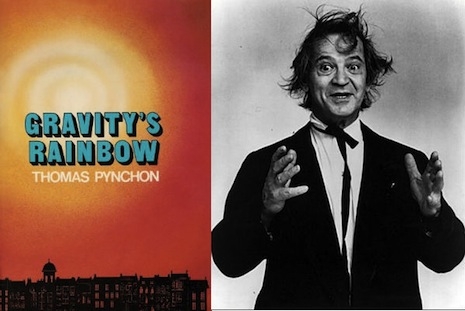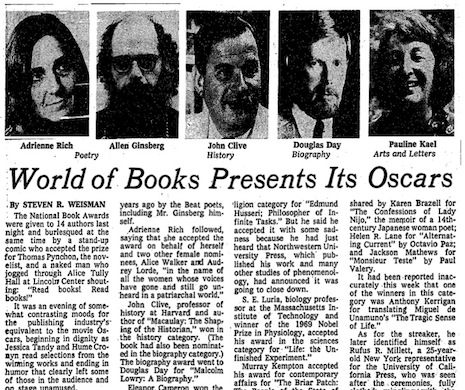
The publication of Gravity’s Rainbow by Thomas Pynchon was one of the most important events in American publishing during the postwar era. Everyone who grappled with it at the time recognized it to be an unusually interesting and impressive work—it’s also very long—but it also engaged, in a high-minded way, the counterculture. The book is above all about paranoia. It features five “Proverbs for Paranoids,” including, “If they can get you asking the wrong questions, they don’t have to worry about answers.” One of the book’s characters is young Malcolm Little, later Malcolm X, and the epigraph to the book’s final section (“What?”) came from Richard Nixon himself. Gravity’s Rainbow was so polarizing that it led to a stalemate among the Pulitzer Prize voting committee; for the year 1974, there is simply no award given. (Causing a schism of this type is much cooler than winning a Pulitzer, I reckon.)
Through the unusual mix in his books of science, conspiracy, corny jokes, and rock music (most of his books have made-up rock or pop lyrics as part of the text, and Gravity’s Rainbow is no exception), Pynchon has always been one of those writers, like Kurt Vonnegut and Tom Robbins, whose audience did not consist merely of literary types. Pynchon’s audience, as far as I can tell, always had more than its share of autodidacts, computer programmers, truckers, rock music fans. For a difficult author, Pynchon has had something like the common touch. The corny jokes part of the equation is an important one. In his introduction to Slow Learner, a volume of Pynchon’s stories, the author cites Spike Jones (no, not Spike Jonze) in a way that suggests a deeper connection.

Which leads us to the 1974 National Book Awards. As mentioned, Gravity’s Rainbow was a big enough deal that people pretty much knew it was going to win for best novel. There was a big gala held at Alice Tully Hall in Lincoln Center in New York, and everyone present also knew that Thomas Pynchon, being extremely reluctant to appear in public, was unlikely to show up. And yet, one just never knew, did one? ... Instead of making an appearance, Pynchon (actually Pynchon’s publisher Thomas Guinzburg, pictured below) sent in his place comedian Professor Irwin Corey, whose schtick consists mainly of butchering hifalutin language, including bad puns, malapropisms…. basically the ultimate absent-minded professor. Oh—and just for fun, the proceedings were also interrupted by a streaker. It was the 1970s! Stuff like that happened.
The ceremony took place on April 18, 1974. The next day, the New York Times account of the event related the following:
The National Book Awards were given to 14 authors last night and burlesqued at the same time by a stand-up comic who accepted the prize for Thomas Pynchon, the novelist, and a naked man who jogged through Alice Tully Hall at Lincoln Center shouting: “Read books! Read books!”
…Professor Irwin Corey, the comedian who bills himself as “the world’s greatest expert on everything,” accepted Mr. Pynchon’s prize and took off into a series of bad jokes and mangled syntax that left some people roaring with laughter and others perplexed.
Some in the audience wondered whether Mr. Corey—who pounded the podium and shouted such aphorisms as “He who underestimates the American public will not go broke”—was, in fact, the reclusive Mr. Pynchon himself.
It turned out, however, that his appearance was a jape contrived by Thomas Guinzburg, head of Viking Press, publishers of “Gravity’s Rainbow,” which won the award for Mr. Pynchon.
George Plimpton of the Paris Review remembered it this way: “Tom [Guinzburg] was fairly sure that Pynchon was going to win the National Book Awards, but he knew that Pynchon wasn’t going to appear. And so in a wonderful bit of imagination and cleverness, he got this wonderful actor called Professor Corey. ... So he came out onto the stage, and Thomas Pynchon was announced and a great roar of applause ... because everybody knew that Pynchon was more or less a recluse, and to have him actually appear to get his award, everybody stared at this man, who then proceeded to give an acceptance speech.”
The award was shared by Gravity’s Rainbow and Isaac Bashevis Singer’s A Crown of Feathers. Corey/Pynchon was introduced by none other than Ralph Ellison In the speech, Corey referred to “himself” as “Richard Python,” had a lot of fun with the name of noted author Studs Terkel, and referred to Henry Kissinger as the “acting president of the United States.”
For those who know Pynchon’s works, this idea of Guinzburg’s to substitute Corey for the author was ... well, deliciously perfect. It was an Andy Kaufman move before the age of Andy Kaufman. You can read Corey’s remarks below, they are the ideal mix of high-minded and utterly moronic, a combination that somehow obtains for Pynchon’s works as well.
Here’s the full text of Prof. Corey’s remarks that night, from his website, with all typos and formatting retained.
However ... accept this financial stipulation—ah—stipend in behalf of, uh, Richard Python for the great contribution and to quote from some of the missiles which he has contributed. ... Today we must all be aware that protocol takes precedence over procedure. Howewer you say—WHAT THE—what does this mean ... in relation to the tabulation whereby we must once again realize that the great fiction story is now being rehearsed before our very eyes, in the Nixon administration ... indicating that only an American writer can receive ... the award for fction, unlike Solzinitski whose fiction doesn’t hold water. Comrades—friends, we are gathered here not only to accept in behalf of one recluse—one who has found that the world in itself which seems to be a time not of the toad—to quote even Studs TurKAL. And many people ask “Who are Studs TurKAL?” It’s not “Who are Studs TurKAL?” it’s “Who am Studs TurKAL?” This in itself as an edifice of the great glory that has gone beyond, and the intuitive feeling of the American people, based on the assumption that the intelligence not only as Mencken once said, “He who underestimates the American pubic—public, will not go broke.” This is merely a small indication of this vast throng gathered here to once again behold and to perceive that which has gone behind and to that which might go forward into the future ... we’ve got to hurdle these obstacles. This is the main deterrent upon which we have gathered our strength and all the others who say, “What the hell did that get?”—We don’t know. We’ve got to peforce withold the loving boy. ... And as Miller once said in one of his great novels—what did he ... that language is only necessary when communication is endangered. And you sit there bewildered, and Pinter who went further said “It is not the lack of communication but fear of communication.” That’s what the Goddamn thing is it’s we fear—communication. Oh—fortunately the prize has only been given to authors—unlike the Academy Award which is given to a female and a male, indicating the derision of the human specie—God damn it! But we have no paranoia, and Mr. Pynchonhas attained, and has created for himself serenity, and it is only the insanity that has kept him alive in his paranoia. We speak of the organ ... of the orgasm ... Who the hell wrote this? And the jury has determined to divide the prize between two writers—to Thomas Pynchon for his GRAVITY’S RAINBOW. Now GRAVITY’S RAINBOW is a token of this man’s genius ... he told me so himself ... that he could ... in other words, have been more specific, but rather than to allude the mundane, he has come to the conclusion that brevity is the importance of our shallow existence. God damn. Ladies and Gentlemen. To the distinguished panel on the, on the dais and to the other winners, for poetry and religion and science. The time will come when religion will outlive its usefulness. Marx, Groucho Marx, once said that religion is the opiate of the people. I say that when religion outlives its usefulness, then opium ... will be the opiate ... Ahh that’s not a bad idea. ... All right. ... However, I want to thank Mr. Guinzburg, Tom Guinzburg of the Viking Press, who has made it possible for you people to be here this evening to enjoy the Friction Citation—the Fiction Citation. GRAVITY’S RAINBOW—a small contribution to a certain degree, since there are over three and a half billion people in the world today. 218 of them ... million live in the United States which is a very, very small amount compared to those that are dying elsewhere. ...Well, I say that you will be on the road to new horizons, for we who live in a society where sex is a commodity and a politician can become a TV personality, it’s not easy to conform if you have any morality. ... I, I, I said that myself many years ago. ... But I do want to thank the bureau. ... I mean the committee, the organization for the $10,000 they’ve given out ... tonight they made over $400,000 and I think that I have another appointment. I would like to stay here, but for the sake of brevity I, I must leave. I do want to thank you, I want to thank Mr. TurKAL. I want to thank Mr. Knopf who just ran through the auditorium [this is a reference to the streaker] and I want to thank Breshnev, Kissinger—acting President of the Unites States—and also want to thank Truman Capote and thank you.
Here’s a short video about that evening: